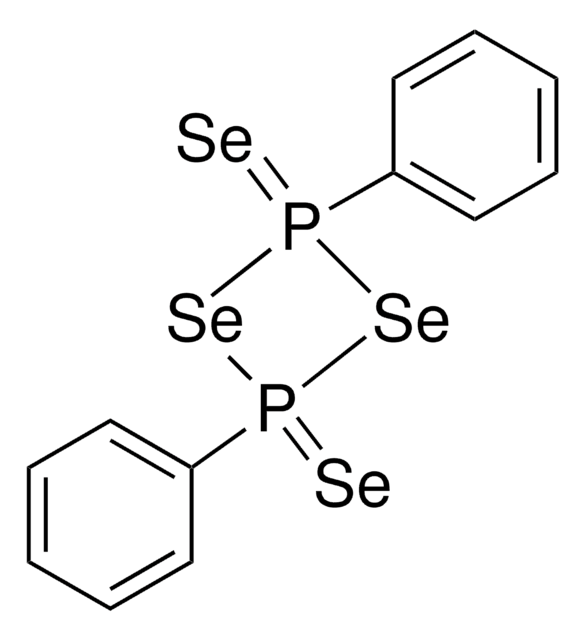08902
Triphenylphosphine oxide
analytical standard
Synonym(s):
Ph3PO, TPPO, Triphenyl phosphorus oxide, Triphenylphosphine monoxide
About This Item
Recommended Products
grade
analytical standard
Quality Level
Assay
≥98.5% (HPLC)
shelf life
limited shelf life, expiry date on the label
technique(s)
HPLC: suitable
gas chromatography (GC): suitable
mp
150-157 °C (lit.)
application(s)
pharmaceutical
format
neat
SMILES string
O=P(c1ccccc1)(c2ccccc2)c3ccccc3
InChI
1S/C18H15OP/c19-20(16-10-4-1-5-11-16,17-12-6-2-7-13-17)18-14-8-3-9-15-18/h1-15H
InChI key
FIQMHBFVRAXMOP-UHFFFAOYSA-N
Looking for similar products? Visit Product Comparison Guide
Application
- Fluoride sensing in coordination polymers: Triphenylphosphine oxide is utilized in the development of lanthanide-based coordination polymers for selective fluoride sensing, demonstrating its utility in intramolecular proton transfer mechanisms for enhanced detection capabilities (Singh et al., 2024).
- NMR shielding calculations: The compound′s influence on solvent effects and convergence of phosphorus-31 NMR shielding calculations is explored, highlighting its role in computational chemistry for better understanding molecular interactions (Calcagno et al., 2024).
- Hydrogen bond characterization: Triphenylphosphine oxide is investigated for its interactions with substituted phenols, where shifts in phosphorus-oxygen stretching bands are analyzed to characterize hydrogen bonds, enhancing our understanding of molecular dynamics in phosphine oxides (Kostin et al., 2024).
- Advances in utilization: A review discusses the broad applications of triphenylphosphine oxide beyond its traditional uses, focusing on its emerging roles in various chemical transformations and its potential in catalytic processes (Zhang and Han, 2024).
- Covalent bonding studies with lanthanides: The role of 4f-orbitals in forming covalent bonds between lanthanides and triphenylphosphine oxide is examined using X-ray absorption spectroscopy and density functional theory, providing insights into the electronic structure and bonding behavior in these complexes (Zhang et al., 2024).
Analysis Note
Other Notes
The collision cross section (CCS) measurement was provided by Waters Corporation, using the SYNAPT XS mass spectrometer.
For a description and overview of how ion mobility enables the measurement of the CCS of an ion visit ims.waters.com.
Further information on the SYNAPT XS mass spectrometer can be found on the IMS microsite and product webpage.
TWCCS measurements are expected to be within 2% of this reference value.
P/N 08902 is part of the Waters Extractables & Leachables UNIFI scientific library which can be downloaded from Waters Marketplace.
Recommended products
Signal Word
Warning
Hazard Statements
Precautionary Statements
Hazard Classifications
Acute Tox. 4 Oral - Aquatic Chronic 3
Storage Class Code
11 - Combustible Solids
WGK
WGK 2
Flash Point(F)
356.0 °F
Flash Point(C)
180 °C
Regulatory Listings
Regulatory Listings are mainly provided for chemical products. Only limited information can be provided here for non-chemical products. No entry means none of the components are listed. It is the user’s obligation to ensure the safe and legal use of the product.
ISHL Indicated Name
Substances Subject to be Indicated Names
ISHL Notified Names
Substances Subject to be Notified Names
JAN Code
08902-VAR:
08902-BULK:
08902-100MG:
Choose from one of the most recent versions:
Already Own This Product?
Find documentation for the products that you have recently purchased in the Document Library.
Our team of scientists has experience in all areas of research including Life Science, Material Science, Chemical Synthesis, Chromatography, Analytical and many others.
Contact Technical Service









